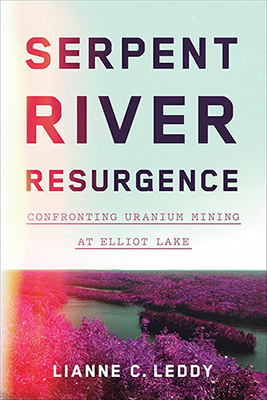The Melville-Nelles-Hoffmann Environmental History Lecture is an annual speaking event hosted by the Department of History at York University. It is generously supported by two of the History Department’s founding environmental history professors, H.V. Nelles and Richard Hoffmann and it honours the memory of the late Elinor Melville, our colleague and leading researcher in the field of Mexican environmental history.
2024 Lecture

Lianne Leddy: Serpent River Resurgence: Confronting Uranium Mining at Elliot Lake
Date: Thursday November 14, 2024, 3-5 p.m.
Location: Schulich Executive Dining Room, York University
Join us for the 2024 Melville-Nelles-Hoffmann Lecture! We are delighted to welcome Anishinaabe scholar Lianne C. Leddy, who will share her work on how the Serpent River Anishinaabek confronted the persistent forces of settler colonialism and the effects of uranium mining at Elliot Lake, Ontario.
In Serpent River Resurgence, Leddy draws on extensive archival sources, oral histories and newspaper articles to examine the environmental and political power relationships that affected her homeland in the Cold War period.
With its focus on Indigenous-settler relations, the environmental and health consequences of the uranium industry, and the importance of traditional uses of land and what happens when they are compromised, Serpent River Resurgence explores how settler colonialism and Anishinaabe resistance remained potent forces throughout the second half of the twentieth century.
Lianne Leddy
Lianne Leddy is a Tier 2 Canada Research Chair in Indigenous Histories and Historical Practice in Canada and an associate professor of History at Wilfrid Laurier University. She is a member of Serpent River First Nation and grew up in Elliot Lake, Ontario. Leddy’s research focuses on Indigenous history in what is now Canada, with a focus on land, gender and historical methods.
Serpent River Resurgence: Confronting Uranium Mining at Elliot Lake was published by the University of Toronto Press in 2022 to much critical acclaim. In 2023, it was honoured with three prestigious awards from the Canadian Historical Association: the Clio Prize for best book on Ontario history, the Indigenous History Book Prize and the Best Scholarly Book in Canadian History Prize.
Leddy’s work has appeared in several edited collections, as well as the Canadian Historical Review, NAIS, Oral History Forum and Herizons.

